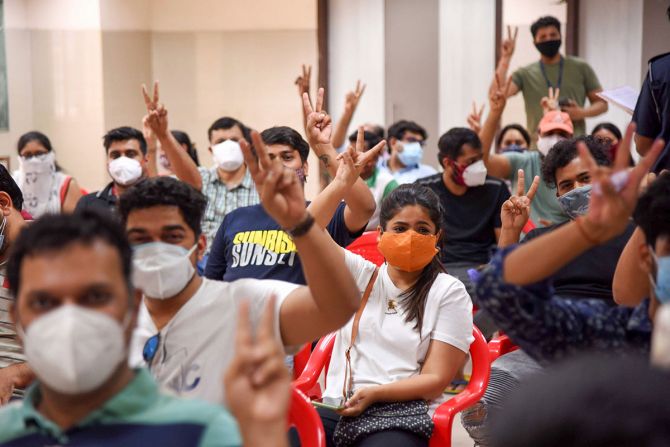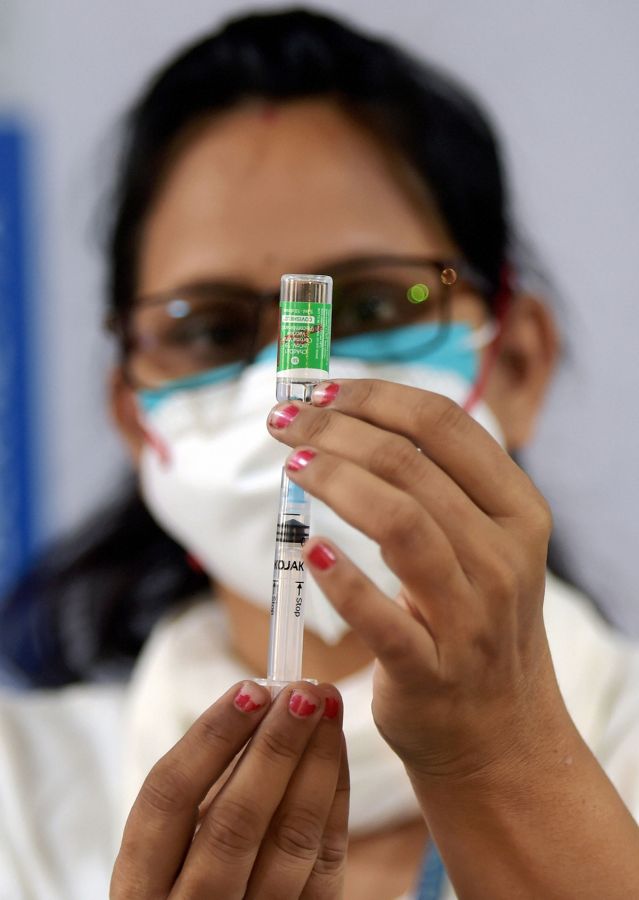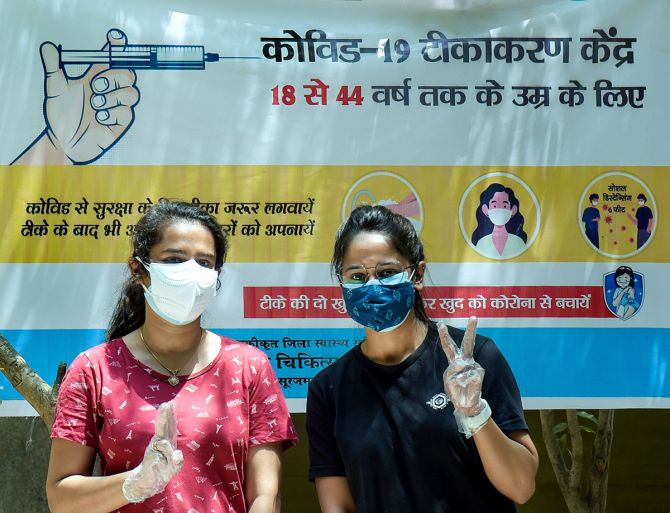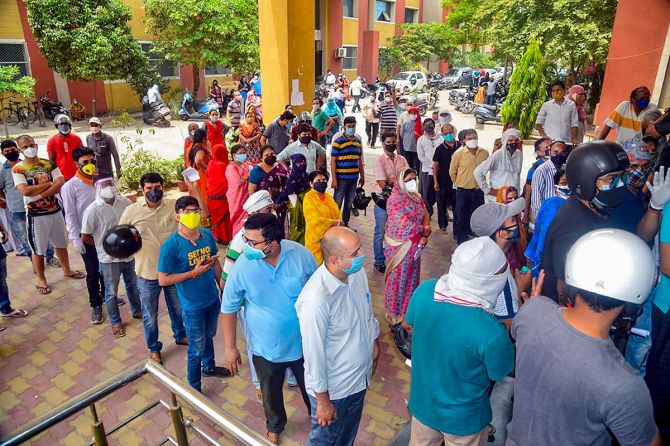'One thing we have learnt is that a pandemic can be arrested at any stage.'
'Not suddenly, of course but slowly with steady unwavering focus.'

"In the '60s we helped eradicate smallpox not only from our country, but from the entire planet. In the '90s the polio campaign reached the corners of every small village in India. Today we have technology and resources way beyond what we had 80 years ago. Opening up vaccination for all and decentralisation is the key," says Dr Rajesh Parikh, director of medical research at Mumbai's Jaslok Hospital.
Dr Parikh, below, one of India's leading neuropsychiatrists, has spent the last year researching COVID-19. He has co-authored The Coronavirus, What You Need To Know About The Global Pandemic and written The Vaccine Book for Covid-19.
An alumnus of Mumbai's G S Medical College and Baltimore's Johns Hopkins University School of Medicine, the cerebral Dr Parikh told Rediff.com's Archana Masih over e-mail that it's never too late to save lives, what India must to do to arrest the virus and why we should stop hiding our infections and deaths.
In an interview in May last year, you had very presciently said, 'This storm comes in cycles. There will probably be other storms in formation, may be some of greater ferocity. We must never underestimate the tiny SARS-CoV-2 virus'.
Where did India go wrong in handling the pandemic that has brought us right in the eye of the storm?
First of all, we have done well on many fronts from containing the first wave to ramping up our health infrastructure to vaccine production.
Where, I believe, we slipped is in being lulled into a false sense of security too early and in not anticipating the second wave and those that might follow.
We did not heed George Santayana's warning about learning the lessons of history.

India leads the world in the daily average of reported infections and death. As a doctor who wrote the first book on this pandemic and has spent the last year researching and studying the virus, what can we do now to save lives?
Do you see a way out of this catastrophe? Or is it too late?
It's never too late to save lives. In the course of writing our two books, we have read over 1,500 scientific papers and a few books on pandemics.
One thing we have learnt is that a pandemic can be arrested at any stage. Not suddenly, of course, but slowly with steady unwavering focus.
We need to do three things: Vaccinate, vaccinate and vaccinate!
If the government were to ask you for advice, what would you tell them? What would be some immediate and long-term measures that are required to brace for a third/fourth wave?
I doubt they will because I have a nasty habit of saying things people do not want to hear. But let us indulge in a fantasy for a moment, I would say what I have been saying for over 14 months, please vaccinate as many as quickly as possible.
I realise that given where we are today, mass vaccination is easier said than done. So let us do the other things which the government is indeed doing rather well.
Immediately step up oxygen capacity and equitable distribution, start preparing for the third wave by further ramping up infrastructure, increase the budget allocation to health from a measly 1.26% of our GDP which makes us 145th in the list of 195 nations in terms of quality and access to health care, much lower than Sri Lanka and Bangladesh according to the Lancet.

You have written two books on the coronavirus and on the vaccine. Given the size of our population, the big challenge is the production, distribution and administration of the vaccines. Now that we are facing such a severe shortage of vaccines, how can we fix our vaccination problems?
To quickly move beyond vaccination for now.
Oxygen supply can be ramped up.
Advocating medicines with unproven efficacy can be stopped.
Religious gatherings and political rallies can be delayed.
Individuals in high advisory positions could hopefully look beyond their immediate self interest towards that of our nation and also consider their own enlightened self-interest.
But I forgot we were fantasising only in the previous question!
India has run very successful vaccination programmes -- the polio campaign is something we can be very proud of. You were yourself involved in the polio campaign -- what are some of the lessons from the polio vaccination drive that we should have incorporated into the COVID-19 vaccination effort?
Decentralisation. On behalf of Rotary International and the Bombay Club, I took charge of the 'E' ward (the BrihanMumbai Municipal Corporation divides Mumbai into different wards for administrative purposes) for the polio campaign because it posed the greatest challenges.
The brothels of Mumbai are in that district. I had a highly motivated team of college students from St Xavier's College and HR College (both located in South Mumbai) who treated the women and their children with dignity and compassion.
I set them an impossible target of 100%. I was astonished to see we had exceeded it. When we double checked the data, we realised that the enthusiastic and dedicated youngsters had vaccinated every child that went into or stepped out of a State Transport bus in the central (bus) depot (also located in 'E' ward)!
Some of them teased me by calling me Dr100% Plus!
How can we vaccinate large swathes of our population? What is the best way forward?
We have done this twice in the past. The first time in the '60s when we helped eradicate smallpox not only from our country, but from the entire planet.
The second time in the '90s with the polio campaign which reached the corners of every small village in India.
Today we have technology and resources way beyond what we had 80 years ago. Opening up vaccination for all and decentralisation is the key.

What would you say has been the world's response so far? Which countries have dealt with the virus better than others?
Many. China, South Korea, Singapore, Israel, the UK and the US to name a few. Most of them made many mistakes along the way. The important thing is they acknowledged their errors, learnt from them and most of all, they did not repeat them.
What can India learn from the countries that have performed better and what help/assistance/expertise should India be taking from these countries?
Humility, the grace to receive help of any kind, ensuring health equity and transparency.
We could set up an International Advisory with leading scientists from successful programmes and take their suggestions seriously.
To quote the medical historian Harold Merkel, 'From the political to the purely mercenary, secrecy has almost always contributed to the further spread of a pandemic and hindered public health management'.
We should stop hiding our infections and deaths and deal with reality. We should be confident in our ability and not be insecure about how we appear in the international community.
The virus has taught us among other things that as long as some of us in the world are unsafe, all of us are unsafe!
Feature Presentation: Aslam Hunani/Rediff.com











 © 2025
© 2025